A bill signed into law in Arizona on Wednesday makes it illegal to film police officers within 8 feet of law enforcement activity.
The law, which takes effect in September, was sponsored by Republican state Rep. John Kavanagh and signed by Gov. Doug Ducey, who’s also a Republican.
The new Arizona law states that “It is unlawful for a person to knowingly make a video recording of law enforcement activity if the person making the video recording is within eight feet of where the person knows or reasonably should know that law enforcement activity is occurring.”
A person who records police within 8 feet of them may face a misdemeanor charge after they have been warned once to back up.
The Arizona law states that it applies to situations in which a police officer is questioning a suspicious person, conducting an arrest, issuing a summons or enforcing the law, and dealing with an emotionally disturbed person who is exhibiting abnormal behavior.
It makes an exception for police activity on private property where the person recording is authorized to be on the property, but it also states that an officer can order the person recording to leave the area if the “law enforcement officer determines that the person is interfering in the law enforcement activity.”
A person who is the subject of police activity may also record as long as they are not handcuffed, searched, or subjected to a field sobriety test, according to the law.
The Arizona law also says that people in a vehicle stopped by police can also record “if the occupants are not interfering with lawful police actions.”
In February, the National Press Photographers Association issued a letter condemning the bill as unconstitutional. The bill proposed at the time that people could not take videos of police officers from 15 feet away or less.
“We are extremely concerned that this language violates not only the free speech and press clauses of the First Amendment, but also runs counter to the “clearly established right” to photograph and record police officers performing their official duties in a public place,” said the letter, signed by The Associated Press, The New York Times Company and other organizations.
“We believe that requiring the “permission of a law enforcement officer” and setting a minimum distance of fifteen feet in between the law enforcement officer and the person recording, would not survive a constitutional challenge and is completely unworkable in situations (such as demonstrations and protests) where there are multiple officers and people recording,” the letter said.
Kavanagh wrote in a March op-ed that he had made concessions on the bill, lowering the buffer zone and adding exceptions. He stated that he proposed the bill after Arizona police officers approached him with concerns about “groups hostile to the police.”
Kavanagh said he introduced the bill for safety reasons, “Getting very close to police officers in tense situations is a dangerous practice that can end in tragedy,”
He also stated that he believes the law will not have an impact on the integrity of police recordings. “A video taken from 8 feet away probably takes in the entire scene providing more information and greater context,” he wrote.
Videos of interactions with law enforcement officers have become an increasingly vital tool for revealing police misconduct.
Cellphone videos of deadly police encounters captured by civilians have gained widespread attention and have been prominently displayed in courtrooms, though they do not always result in charges being filed against officers.
Darnella Frazier was 17 years old when she used her cellphone to film a white police officer, Derek Chauvin, as he knelt on George Floyd’s neck and murdered him. Her video refuted the Minneapolis Police Department’s initial, inaccurate account of his death.
The video of Eric Garner dying in a police chokehold in 2014, which was captured by his friend Ramsey Orta, was widely circulated as well, but a Staten Island grand jury refused to indict the officer who used the chokehold, Daniel Pantaleo.
The Arizona Civil Liberties Union stated on Twitter that the law would make it more difficult to hold police officers accountable for misconduct and would relax “the use of the public’s most effective tool against police wrongdoing.”

